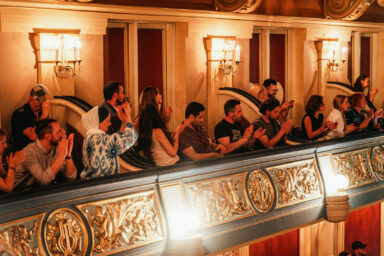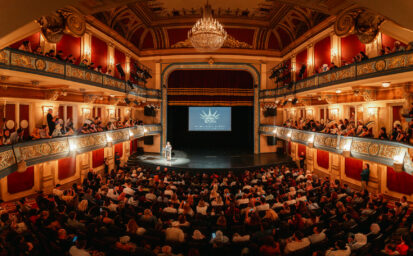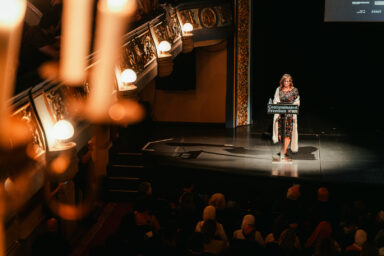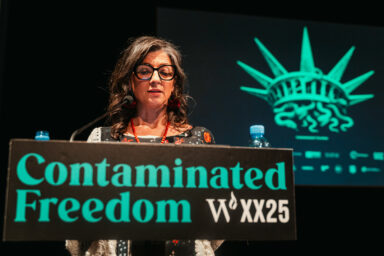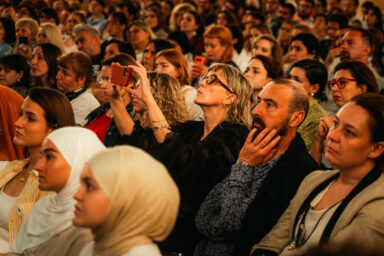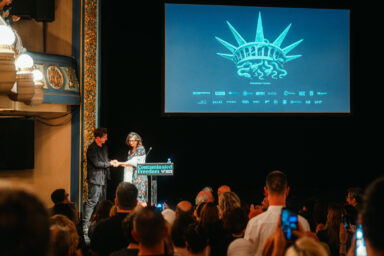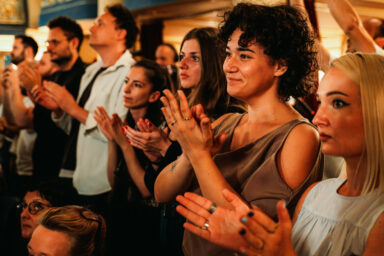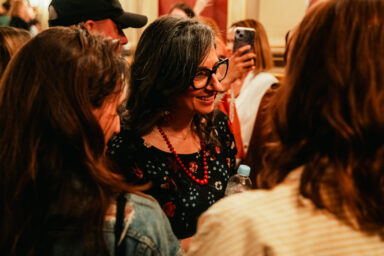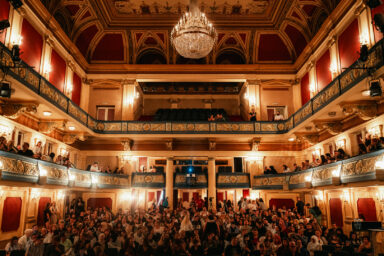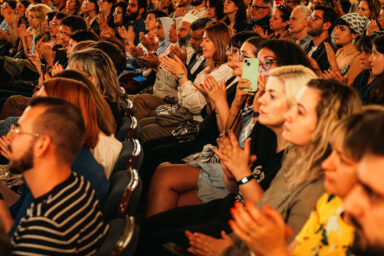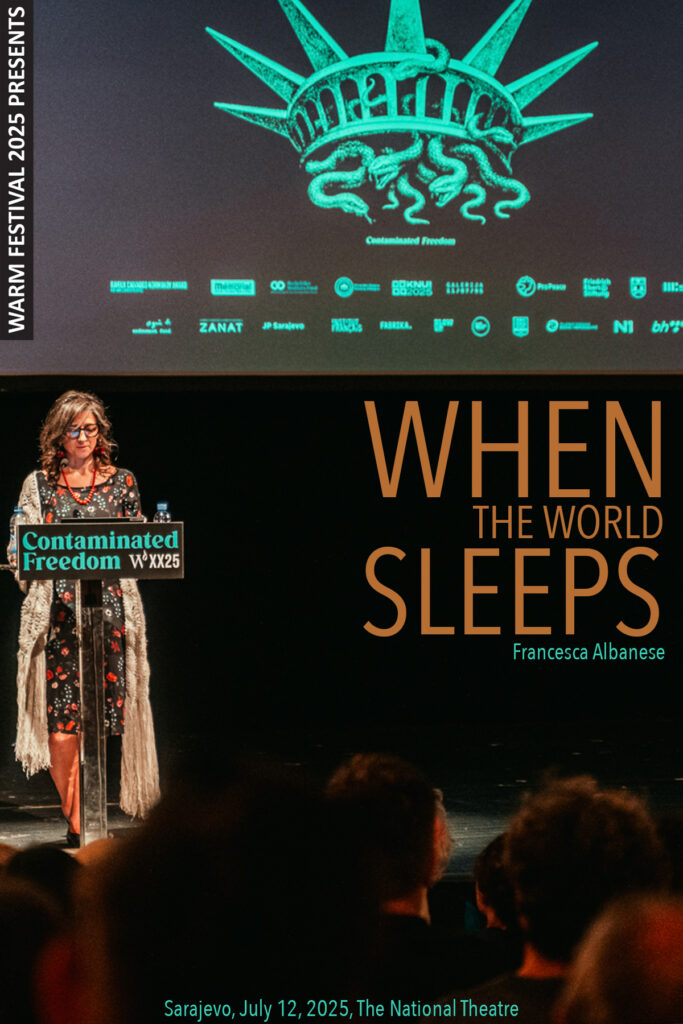
Francesca Albanese: When the World Sleeps
WARM FESTIVAL 2025
Francesca Albanese – Keynote Speech
12 July 2025, Sarajevo
1982.
It’s a late September afternoon. I’m five years old, curled on the couch with my parents. Italy is still glowing from its summer World Cup victory, and joy colors our faces.
Suddenly, the rupture.
The broadcast cuts out.
Shocking images from a nearby country: bodies piled on top of one another. I don’t understand. Their clothes look like ours — like my father’s, my mother’s, mine.
The children, too. Some of them are in pieces.
“No, they’re not sleeping,” my mother says, covering my eyes nervously.
Under the watch of a general who would become Prime Minister twenty years later, three thousand Palestinian civilians were slaughtered in refugee camps west of Beirut – during just two days.
That was the first time I heard the word refugee. I instinctively linked it to those lifeless bodies scattered like broken dolls on the burning asphalt.
Three months later, the UN declared Sabra and Shatila a genocide.
I remember the adults’ voices in a state of disbelief I had never seen before “How could this happen? How did we get here?”
—-
Years later, I read a book in school by a man named Primo which in Italian means ”First”.
His last name — Levi — matched my favorite blue jeans. But Primo? What kind of a name is it? The name intrigued me.
That book was a testimony. It spoke of a place where people were stripped of everything: their names, their hair, their clothes – their dignity.
A grey camp, encircled by barbed wire.
A number tattooed on their arms. Starved, beaten, abused.
Alive, but barely.
Condemned to, as his poem says:
“work in the mud,
that knows no peace,
that dies for a yes or for a no.”
Women, too:
“Hairless and nameless,
eyes hollow, wombs cold,
like frogs in winter.”
Stunned, I asked my father:
“Papà… is it true?”
“Si Nenné,” he said softly. “It happened.”
Another encounter with the word genocide. This time I grasped its scale – and its horror.
Six million Jews killed. Eight thousand were Italian, like Primo Levi.
A quarter million Roma and Sinti. Another quarter million persons with disabilities, killed.
Thousands of dissidents and “non-conforming” people, crushed by the fantasy of racial purity – an old, deadly idea.
And again, the question:
“How could this happen? How did we get here?”
________________________________
Summer, 1995.
Images trickle into Italy from another nearby country. Late, blurred, yet unmistakable.
They called it “the war in former Yugoslavia.” But it wasn’t just war.
Snipers firing on civilians.
Mass rapes.
Concentration camps.
Villages burned.
Men separated from women.
Mothers and small children forced onto trucks.
Teenaged boys with the men.
Thousands were executed. It happened in many places, and the most atrocious was, in terms of scale and brutality: Srebrenica – in a UN-protected zone.
And the usual piercing question:
“How could this happen? How did we get here?” this time we could add: under UN watch?
________________________________
September 2024.
He calls me. He wants me to play with him.
Inside, on the other side of the window, I am frozen.
On my laptop, a mother runs screaming toward a burning building.
Her child is inside.
That image. Again.
How many images of pure horror have I seen in the last nearly 650 days? How many have I had to verify?
I was writing my fifth UN report – the second documenting the genocide in Gaza.
At that point:
41,000 people killed.
11,000 were children.
A ghetto under assault.
Schools, homes, hospitals, mosques, churches – obliterated.
Whole families wiped from civil registries.
Doctors, bakers, scholars, fishermen – erased.
Among the first to name what was happening in Gaza “genocide” were survivors from Bosnia.
Because like any other genocide survivors, they know the stench. They recognize the march.
Now, it was the rest of the world – students from their encampments, people of all ages coming with tears in their eyes at the end of a lecture, … Asking me “How could this happen? How did we get here?”
________________________________
Despite what western politicians say and claim to know, genocide is not an opinion, based on what has happened in the past, but a crime that corresponds to a very clear legal definition.
Genocide is not just mass killing or extermination. It’s the destruction of a people as such.
Killing.
Inflicting physical or mental harm.
Creating conditions of life calculated to destroy.
Preventing births.
When done with intent to destroy a group, those acts are genocide.
Israel has committed every one of them in Gaza.
Over 60,000 dead. Experts say four times more – over 300,000 – may have died from hunger, thirst, infection, untreated wounds.
Starved, burned, shriveled in tents.
Babies cradled in dry arms.
Children turned to shadows.
70% of victims are women and children.
Not by accident – but because of Gaza’s demographics.
Eighteen thousand children killed.
The intent is clear.
It is spoken.
It is being carried out.
To erase Palestinian life – starting with its children.
________________________________
And once again the question returns:
“How could this happen? How did we come to this?”
After months of answering that question – in many languages, to thousands who share the same sense of powerlessness – I finally see it clearly.
When reason is extinguished, monsters are born.
When humanity is dimmed, genocide walks back in.
Genocide is not a single act. It is a process, that begins the moment one stops seeing the other as a person and reduces them to an abstract mass, fit only for stereotyping and prejudice, judgment, punishment or erasure.
Genocide is the dormant gene of de‑humanisation, activated when hatred becomes doctrine, and from there political ideology.
So the real question is no longer how it happened, but how we stop it.
Genocide should be hard to commit in 2025: the law gives us tools to prevent it – but only if we recognise it.
Today the world splits in two: those who see this horror and act, and those who look away – for fear, for profit, for convenience.
That paralysis feeds our feeling of impotence.
Which brings us to the core: power.
And this is the word I want to place strongly and firmly at the heart of the laboratory of resistance that is the WARM festival.
Power.
We usually picture power as force, domination – a peak from which the strong rule: governments, corporations, armies, algorithms deciding what we see and think. A loud, alpha‑male power that flexes its chest, shows off its muscles yet hides its own fragility.
But is that all power is – something to seize or to suffer?
What of the rest of us, who command no armies, control no algorithms and own no financial empires?
Are we powerless? No, no if we decide to belong to the army of what photographer Misan Harriman calls of “moral warriors”.
Moral warriors have another power.
Not power over (a noun of conquest), but power to (a verb of possibility). They have a kind of power that is generated, not possessed; shared, not hoarded. It is intimate, even maternal: an energy that creates, welcomes, transforms, and binds.
This generative power hurts to bring forth the new, but that is exactly what we need.
Power to see.
Power to act.
Power to change.
Today, Palestine is a test for humanity.
Not only because, as human beings, the other is us.
But because Palestine reveals far too much of what is broken in our own homes.
It is a thermometer of returning ghosts and of repression already underway.
We see it clearly: repression is not only in Palestine.
When truth becomes frightening, and those who speak it are silenced.
When a journalist is fired for daring to report.
A professor suspended for daring to explain.
A host denounced for daring to show.
When those who protest are beaten with batons.
When those who demand freedom – from genocide, occupation, apartheid – are called “terrorists”.
When the very people asking for the enforcement of the laws we wrote 80 years ago – so that fascism would never return, and genocides never happen again – are met with contempt.
Then yes: a reckoning is needed.
A firm, collective awakening.
We must choose – actively – to defend what is right, beginning with our fundamental rights: those we claimed for ourselves and for others.
The power to think, to speak, to dissent.
The power not to stay silent.
The power to ignite the light within us.
To activate the power that lives within us.
Because we are power. Power in motion – seeking, reaching, joining.
Alone, we may falter.
But together, we can illuminate.
To see, to see one another – and together, to bring about the change that is now urgent.
A single candle may flicker out with a child’s breath.
But a thousand candles can set the world ablaze.
What we need now is precisely that symbolic fire:
The fire of reason, of restored conscience – of Logos – not to destroy, but to light the way.
Let it be a sacred fire, moral warriors.
And from its flames, may we be reborn – clearer, freer, more human.
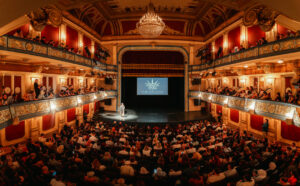
(Photography by Ahmed Avdagić)
